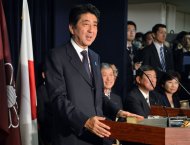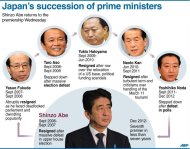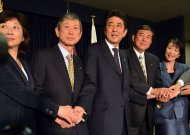Shinzo Abe was elected Japan's prime minister by the
lower house of parliament on Wednesday after he swept to power on a
hawkish platform of getting tough on diplomacy while fixing the economy.
The powerful lower house named the 58-year-old as the country's new
leader following a resounding national election victory for Abe's
Liberal Democratic Party earlier this month over the Democratic Party of
Japan (DPJ)."This chamber decides to name Mr Shinzo Abe as prime minister," said lower house speaker Bunmei Ibuki after the vote.
Lawmakers voted in Abe's favour by 328 votes to 57 for the DPJ's newly chosen leader Banri Kaieda, the industry minister during last year's Fukushima nuclear crisis.
Earlier Wednesday, the yen tumbled against the dollar on growing speculation that the Bank of Japan will usher in further easing measures to boost the economy -- a key plank of Abe's campaign.
As Japan's seventh premier in less than seven years, Abe replaces Yoshihiko Noda whose DPJ suffered a stinging defeat at the polls.
The party, which came to power in 2009, was seen as being punished for policy flip-flops and its clumsy handling of last year's atomic disaster at Fukushima.
As expected, Noda's cabinet resigned en masse Wednesday morning before the LDP-controlled lower house named Abe as next leader.
Abe, who previously served as prime minister from 2006 to 2007, is expected to form a new cabinet later in the day as he rushes to draft an extra budget to spur the nation's flagging economy.
Japanese media have suggested Abe was likely to tap close associates and senior party members for key posts.
Taro Aso, another former prime minister in Japan's revolving-door political system, was widely expected to be named as both Abe's deputy and also finance minister, the reports said.
New foreign minister was likely to be Fumio Kishida, who served as a state minister in charge of Okinawan affairs during Abe's previous tenure.
The expected appointment was seen as a reflection of Abe's desire for progress on the relocation of US military bases in the southern island chain.
The defence portfolio would be handed to Itsunori Onodera, who served as deputy foreign minister for a year during Abe's stint in Japan's top political job and during that of his successor Yasuo Fukuda, reports said.
Sadakazu Tanigaki, the head of the LDP when the party was in opposition after ruling Japan for most of the past six decades, is tipped to become justice minister.
Abe won conservative support with nationalistic pronouncements on diplomacy in the midst of a territorial row with Beijing over a group of East China Sea islands, saying Japan would stand firm on its claim to the chain.
But he quickly toned down the campaign rhetoric and has said he wants improved ties with China, Japan's biggest trading partner.
Abe called for a solution through what he described as "patient exchanges".
The new leader, whose key campaign platform was reviving the world's third largest economy, has also said he would look at revising Japan's post-war pacifist constitution, alarming officials in China and South Korea.
He vowed to pressure the Bank of Japan for further easing measures to boost growth, while also promising big government spending to spur the economy.
Analysts said Abe was likely to delay drastic policy measures ahead of upper house elections next year, while the LDP's moderate junior coalition partner New Komeito could balance his right-leaning instincts.




ไม่มีความคิดเห็น:
แสดงความคิดเห็น